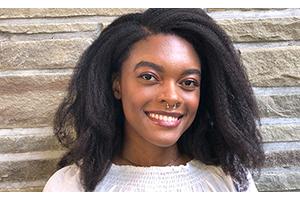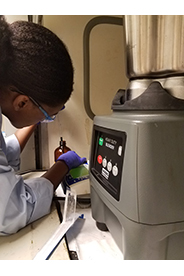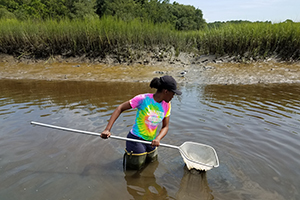Achievements
Cheldina Jean Named 2020 President’s Award Winner

Since reading the word “toxicologist” in middle school, Cheldina Jean, CAS/BA ’20, knew she wanted to be an environmental researcher. Something would pique her interest, or she would see a problem that needed solving, so she would research the issue, then act.
Jean’s academic achievement, leadership, and passion for service are what led President Sylvia Burwell to choose the Haitian-born Miami resident as the 2020 President’s Award winner, the highest distinction for an AU undergraduate.
Jean spoke with University Communications and Marketing to discuss her reaction to the award, her favorite mentors and research experiences at AU, and what she plans to do next. The conversation below has been lightly edited.
UCM: Congratulations on the President’s Award. How did it feel getting the news?
Jean: It was very surprising, and I was really happy about it. When I found out I was a finalist, the first thing I did was tell my mom and all my advisors. They helped me prepare for the interview. After the interview, President Burwell wanted to schedule a follow-up meeting and I was thinking, “What questions could she possible have?” I was mentally prepared to give her more information or clarify something, but then she told me I was the 2020 President’s Award winner.
I just wish the graduation ceremony was happening so my mom could hear my name called out for the award. It would’ve made her so proud, but I know she’s happy for me
UCM: What factored into your decision to attend AU?
Jean: I really liked AU’s sustainability initiatives. That, in addition to financial reasons, was the ultimate deciding factor. I didn’t know anyone in my personal life who had a college degree, so I didn’t know what to expect when I came to AU. I just knew that I had to go to college if I wanted to be a researcher.
I realized AU was the perfect match during my freshman year when I went to the Merit Awards office to apply for a scholarship and met Paula Warwick. I ended up not applying to that scholarship, but Paula helped me find other resources and figure out what my goals were. She’s been my supporter since the beginning and has helped me network and find research opportunities. AU’s strong and supportive community is one of the reasons I’m thankful I chose it.

Photo credit: Katy Chung, NOAA
UCM: You’ve had a lot of research opportunities at AU. How do you think that factored into your success?
Jean: I’ve been able to get research skills because AU and the faculty here are so willing to help you figure stuff out, despite not always having the resources. I was able to participate in a summer internship with the National Science Foundation Research Experience for Undergraduates (NSF REU) after learning about it from the Merit Awards office. I talked with professors about what courses I should take to get a strong research background, and they put me in contact with environmental toxicologists who recommended taking as many stats classes as I could, so that’s what I did.
A lot of the professors here are more than willing to work with students on furthering their research goals, and you’re able to connect with them on a deeper level. I’ve done research with Dr. Matthew Hartings for two years. He incorporated my interests into a project he was already doing. When I told him I wanted to use the technology from that project to focus on cleaning up pollutants, he recommended alternative methods and gave me space in his lab to explore my idea. The amount of guidance and research opportunities I’ve received at AU has helped me develop my aspirations and made me more confident as a researcher.

UCM: Can you describe what environmental toxicology is and what kind of impact you hope to have in the field?
Jean: Environmental toxicology is the study of toxins and other pollutants and how they affect the natural environment and humans. I knew I wanted to be a toxicologist after reading about it in middle school. The word itself was so interesting, so I researched it and realized it aligned with my interests of nature and helping remediate it. However, I later realized that I wanted to do environmental engineering instead, because it is more application-based, and I could have a broader impact.
UCM: You have a lot of research experience under your belt already. Can you talk about one of your favorites?
Jean: My favorite was at NOAA (National Oceanic and Atmospheric Administration), which was through NSF REU. I researched the effects of UV light on oil from the Deepwater Horizon oil spill, and the phototoxic effects the oil had on larval grass shrimp. I really liked that my advisor allowed me to research climate change effects as well. It was a lot of work, but I felt so proud because it was my project. I wasn’t just helping a researcher find results. It was my first experience doing research in toxicology, so I was in the field and working with a toxicologist, and excited to find new results each week. I was like a kid in the candy shop—except with a bunch of chemicals.
UCM: Climate change is arguably one of the greatest challenges our world is facing, so it must have been a cool experience to work on it.
Jean: Yeah, exactly. There’s reading about the effects, then there’s actually seeing them happen in your experiments. Climate change researchers aren’t making the issue sound worse than it is. It really is bad.
UCM: Your service work cleaning up the lily ponds at Kenilworth Aquatic Gardens and tutoring underserved high school students relates to your interests in remediating the environment and serving marginalized communities. Where does this passion come from?
Jean: It comes from my Haitian culture and background. My mother’s side of the family were farmers, and my mom loves plants, so I always felt deeply connected to the environment. When I was younger, I was fortunate to have a backyard, so I was always exploring the environment and later learned that if I wanted to continue doing that, it was important to protect it.
People in marginalized communities, they know what they want, but there are barriers preventing them from getting it sometimes. Helping my mom navigate US culture at a young age made me realize that someone needs to be there for people facing things out of their control. That is my motivation for wanting to learn the languages of communities facing severe water scarcity. Going into environmental engineering and becoming a polyglot to help these people meet a basic human need is a goal I’ve always had.
UCM: In your application, you spoke about racism you endured while at a restaurant in Wilmington, North Carolina, for a conference you attended alone. How do you think universities and organizations can do better to support people of color?
Jean: It was hard because I’m coming from Miami which is such a diverse place. I knew what racism was and what it looked like; I just didn’t know what it felt like, and I wasn’t prepared for it. I went to the Southeastern Estuarine Research Society (SEERS) conference by myself and was really proud of my research and wanted to share it. Everyone at the conference was nice—the incident happened separate from it. When you’re the only black person in the room, and you realize that you’re the last person getting served or getting attention, it’s a really strong realization.
It took me a long time to share it with anyone, but I’m glad I did because the REU program and the people at the conference were so responsive and created resources to support student researchers of color. The director of the REU program is having workshops for future summer cohorts focused on minority women in STEM, and my reflection will be used to start this conversation about what to do in situations like that. The conference has created a buddy system called Student Experience Alliance (SEA) Buddy that pairs students who didn’t come with their mentors, or first-time student attendees, with experienced SEERS student members who serve as a supportive resource for them. I was invited back to participate in the program and would have if COVID-19 hadn’t taken over the world. AU was really responsive because they’ve put me in contact with people at the Center for Diversity and Inclusion (CDI). I’m happy my experience can be used to help prevent situations like this, because if I wasn’t so headstrong, I think it would have made me change my trajectory completely.
UCM: We talk a lot about purpose and making a difference at AU. What do you think your purpose is, and how did AU help you realize it?
Jean: I think my purpose is to help give marginalized people a better life through improving the environment. They suffer the worst consequences but contribute the least to climate change, so it is important to give them a voice. AU helped me realize that through the environmental science department, the classes I’ve taken, and the people I’ve learned from.
AU helped me win awards like the Udall [Undergraduate Scholarship], which allowed me to talk to so many people from different Native American backgrounds and taught me about different environmental justice issues people face. And AU has provided me with the freedom to conduct my own research.
The fact that AU has provided me with a strong and supportive community has helped me realize my purpose as well. Even when I feel defeated, they’re always there to push me and make me realize that I am great and that I am doing these things for a reason.
UCM: What’s next for you?
Jean: I am going to do a PhD program in environmental and chemical engineering at Yale University. I’m going to focus on researching and developing water filtration technology that would help people in developing countries or refugee populations. This summer, I am taking Yale’s online reading course in French to begin fostering my language learning goals, so I am better equipped to do research in the communities I hope to serve.
